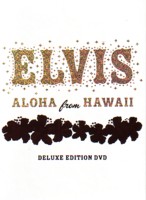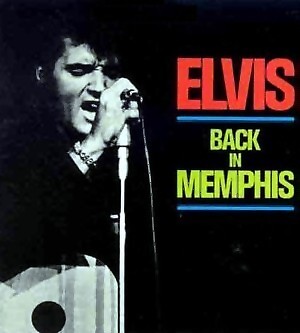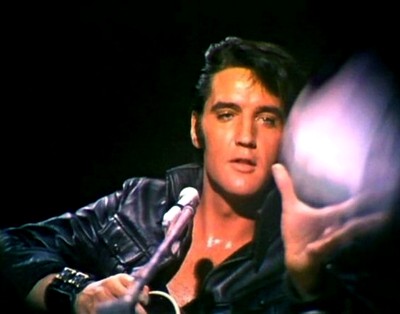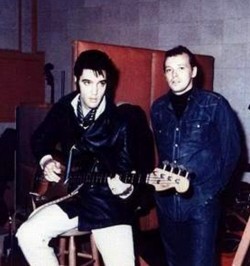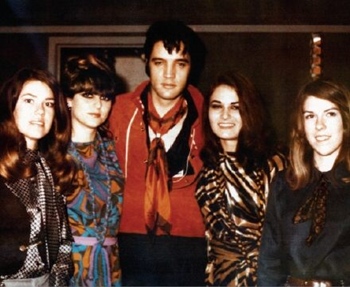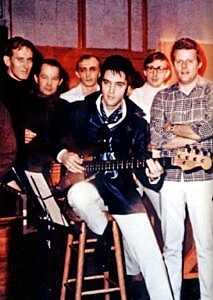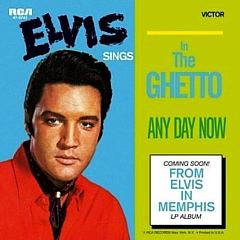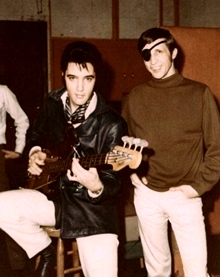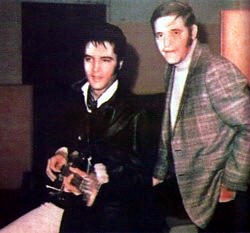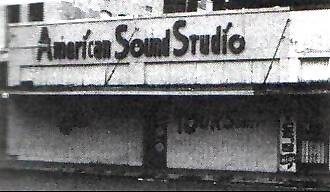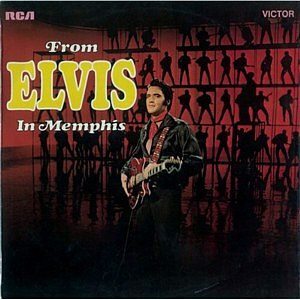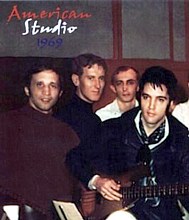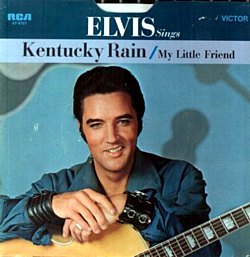 |
 |

Yet amazingly, in 2009, the 40th anniversary of Elvis Presley’s American Studios sessions has essentially passed without so much as a whimper. There is no sign marking the site where these landmark sessions took place. There has been no media focus commemorating the string of hits generated from Elvis’ all too brief Memphis convergence with legendary producer Lincoln Wayne "Chips" Moman and the talented musicians assembled in his studio – musicians who much like Elvis himself seamlessly combined the sounds and influences of Country, Soul, Rock, Folk, gritty Funk and Gospel… all into a beautiful, uniquely Southern soufflé. Elvis Presley Enterprises, stewards of Elvis’ legacy, has oddly not acknowledged these historically significant sessions, which were unquestionably crucial to the growth and advancement of Elvis’ career. While Elvis "tribute artists" are embraced – née, aggrandized – in a circus-esque milieu among shops stocked with various shapes, forms and applications of cheap plastic stamped with Elvis’ name and likeness, another critical milestone slips quietly by. Within this deafening silence, musical purists – those resistant to the hypnotic trance of the meaninglessness of the juggernauting marketing machine – hear a loud echo resonating. It is the sound of a slap… irreverently delivered with utter disrespect across the faces of the profusely talented people who poured their hearts and souls into what would become blockbuster albums and various single releases that thrust Elvis back on top of the heap, solidifying his status as a legend. As 1968 drew to a close, Elvis found himself at a major crossroads in his life and career. His spirit may have been bruised from his personally disappointing detour into "kitschville," but it was in no way broken. His futile fight for Hollywood credibility, respect and relevance led to an impasse and eventually, a sort of spiritual malaise. For so long, he’d simply been going through the motions uninspired – yet, he still possessed an inner spark that pushed him to seek something meaningful to fill the emptiness in his soul. It has been observed and opined by many that perhaps the impetus behind his heightened interest in all things spiritual was his lack of fulfillment in his career. Prohibited from making strides toward projects he yearned to tackle, he was tired – emotionally, mentally, spiritually and creatively. Not too dissimilar to a caged animal, he felt helpless to resist the forces controlling him. But the concessions for which he had lobbied with director Steve Binder from Colonel Parker during production of the wildly successful NBC television special just a few months earlier were a tremendous step. And considering Parker’s tight reign, it was quite an accomplishment. It felt really good… and it was a big step forward that would foreshadow events soon to follow.
Elvis at the June 1968 Comeback Special grasping for new inspiration and creativity.
But with the dramatic changes on the music scene that seemed to leave him behind while he was busy with his series of formulaic movies, did he still have anything to offer in the one area he knew was his true calling? Elvis quietly pondered that thought. But with the transition of a new year, a simple conversation served as the impetus for some major change. That inner spark would soon flare into a raging inferno as he bolted from the confines of both his internal restraint and from external forces to pursue what he wanted – instead of once again settling for what he didn’t. A few days after his birthday on January 8, a gathering of compadres assembled in Graceland’s den while Elvis’ RCA producer Felton Jarvis discussed the Nashville recording session booked for the following week. Memphis Mafia foreman Marty Lacker recounts, "It would have been just another ordinary, boring and really unproductive, non-hit generating session in Nashville – again. He was basically recording to appease Parker and RCA, who were always nagging him for product." Listening to the details of yet another status quo session being hashed out, Marty’s vexation and annoyance could no longer be contained. He shook his head subconsciously in frustration. Elvis looked over to ask, "What the hell’s wrong with you?" As he’d done repeatedly for months, Marty retorted, "I wish for once you would try working with Chips."
A stint with Gold Star Recording Studios in California beckoned, where he attentively observed engineer Stan Ross’s work. Back in Memphis, he parlayed those skills with natural ability and his finely tuned ear into chart success with Brunswick-turned-Stax Studios in the late 1950’s. He produced Stax’s first big hits Gee Whiz by Carla Thomas, You’ll Never Miss Your Water by William Bell among several others. After a few years, he was deeply hurt by broken promises and unfair treatment at Stax. His exodus from McLemore Avenue and entrée to Thomas Street was only the beginning of another level and layer of success. Chips channeled his business acumen into creating American Studios, where he could freely practice creative control. Within a five year period, his group generated a still unrivaled 122 hit records. At one point, American Studios boasted of one-fourth of the songs on the Billboard Hot 100. The creative kinship between Elvis and the plucky, straight-shooting Chips, who has been heralded as the "midwife of (Elvis’) creative rebirth," was obvious. "As Elvis’ talents as a singer are great and come naturally without training, so are Chips’ talents as a guitar player and as a producer," Marty Lacker says. "It’s all in his ears – and in his feeling inside. He just has a natural instinct of what should be on each record while he’s producing it." Two forces of nature. Strong personalities. Tremendous, organic talent. History was yet to be made – and Elvis’ finest work was yet to come. "… you should try working with Chips", Marty Lacker stated. With that assertion, the wheels were set in motion. It was to be an act of rebellion that launched Colonel Parker, his assistant Tom Diskin and Hill and Range song plugger Freddy Bienstock into orbit. The creative freedom Elvis had been yearning for was finally within his grasp. Was he doing the right thing? While the uncertainty nagged at him, he also contended with a nasty cold as the January 13 rendezvous with fate drew closer. The day finally arrived. Elvis nervously walked into the studio full of ace musicians who were unsure of just what to expect from the most famous and highest paid actor in the world. After all, while Elvis was concentrating on his movies, these guys had been busy churning out an impressive succession of hits. He’s a celebrity. Would he be difficult to work with? Would he have an ego? Guitarist Reggie Young recalled, "Personally, I wasn’t that impressed when they said Elvis was going to be in. But then he walked in that back door. We were all standing around. We all kind of took a step back." When the term charisma was mentioned, Young agreed. "It really was. He had that." Keyboardist Bobby Wood elaborated on the charisma dynamic – going so far as to say that the moment Elvis pulled into the parking lot, they could feel his energy inside the building. "When he walked into that back door, I almost choked," Wood said. But whatever skeptical stoicism the group had, it vanished as they were quickly ingratiated by Elvis’ natural warmth and easygoing, personable charm. And soon, they’d be bowled over by his sheer, electrifying talent.
Elvis at American Studios, January 22nd 1969, with backing-vocalists, Mary Holladay,
Jeannie Greene, Donna Thatcher and Ginger Holladay.
Long Black Limousine. Wearin’ That Loved On Look. You’ll Think of Me. This Is The Story. Elvis began what was planned to be 10 days at the funky studio. One musician recalled that the first couple of days were rough in part due to a focus on material from the Hill and Range catalogue – the quality of which had diminished considerably over recent years. Elvis’ upper respiratory ailment that had him feeling less than his best contributed to the raspy, roughened wail evident in the first few songs. Working through the night until 8:30 a.m. the following day, Elvis had reached a level of commitment to the material that he’d not had since his 1966 How Great Thou Art album – which earned him a Best Sacred Performance Grammy. His voice and body in need of rest, he succumbed to the exhaustion of laboring arduously while fighting an illness. But milestones were reached that first critical night. Elvis had easily assimilated into the group, fitting in like an old friend. A brother in music. "They got along great together because they were all from similar backgrounds and felt the music the same way," Marty recalls. Through the sheer passion and fire he exuded through his singing, everyone had sat up and taken notice. It was likened to "being in church" – and he brought the songs to life.
"In Nashville, the musicians basically played what was on the demos – and added nothing really creative, soundwise. That’s the main reason I nagged Elvis about recording with them for almost a year," Marty continued. During the ride home after that first night, Elvis told him and Red West that the session felt great. He wanted to see if he could "do it again" – that is, cut meaningful songs like he did early in his recording career. "He wanted to have hits this time," said Marty. Momentum. Renewed exuberance. Hope.
The collaboration did experience its complications – but they were short-lived and wrought at the hands of the usual power brokers who were threatened by Elvis’ emerging independence. Diskin summoned Parker and spelled out the news; Elvis had dared to stray from the cookie-cutter, assembly line modus operandi of the usual sessions. Parker issued his expected admonitions, with a deriding scoff that Elvis was going to "fall on his ass." But the creative fire that had been kindled could not be extinguished. The quest for artistic fulfillment was now a force majeure that would not be assuaged. The work proceeded until some three dozen sides had been cut by February 22. The heights Elvis reached and the depths he explored to belt every ounce of feeling he could muster would be unparalleled in his recording career.
The sincerity in the way Elvis’ voice melded with the music spoke to our hearts – just as it still does 40 years later. That plaintive ache in Elvis’ voice was back. The kitsch of the movie era was shaken off like layers of road dust from a journey that had taken him much too far away from what he’d always known was his true path: Making damn good music. One fan says, "The songs show how much power and how much heart Elvis really had. His soul is just… all there. Some of the songs selected for the sessions are the most tear-jerking and heartfelt music I’ve ever heard. ‘Superb’ isn’t a strong enough word. And the true centerpieces are the smash hits, In the Ghetto, Suspicious Minds, Kentucky Rain and Don’t Cry Daddy. Need I say more?"
Perfectly exemplifying the lyric from the song Tin Man by 1970’s Folk-Rock band America: "Oz never did give nothing to the Tin Man that he didn’t already have." Certainly, the correlation between Chips Moman and Elvis Presley was in no way like Dr. Frankenstein and his creation. But there can be no doubt that the unique touch, perspective, approach and keen ear of the man behind the board awoke something long dormant within Elvis’ psyche. It was something he silently and self-consciously ruminated compunction whether he still possessed. Chips didn’t give Elvis any talent that he didn’t come into the studio with. But among his contributions were his uncanny ability to know what songs were just right for an artist. He had an assembly of tight, hip, crack Southern musicians and troubadours who instinctively knew how to lay down some sides. And importantly, Chips had an almost supernatural ability from behind the board to invoke and summon all the soul that had for too long been in stasis inside Elvis. Did he still have "it?" Damn straight. And how.
The most important impact of Elvis’ work with Chips Moman, The Memphis Boys, the backup singers and the product of the songwriters at American Studios was that it revived his flagging self-confidence. Through these beloved recordings that only grow sweeter with time, Elvis didn’t just prove to the world that he was back, at his peak and loaded for bear. He proved all these facts to his toughest critic: Elvis Presley.
Yet in the storm of minutiae pushed and promoted by EPE, it has been all too easy for so many to lose sight of the accomplishments that made Elvis a superstar. In the sea of ridiculous "celebriducks," creepy talking heads, coffee cups, shoelaces and even kitchen sink drain plugs hawked by the merchandizing gurus, a wonderful opportunity to educate and enlighten fans and potential fans was passed over. Ignored. Forgotten? Overlooked by mistake? An unfortunate oversight? No reason can be justified to the true fans of the music and to those who genuinely care about Elvis not simply as the artist and entertainer, but as the man because of the sheer magnitude of this project to his career, his life – and the legacy he leaves behind. Maybe the Army years get the nod as celebration-worthy remembrances – because in Priscilla’s hunger for adulation, it is a perfect opportunity to further spin her fairytale, beginning with her initial meeting with her future ex-husband. And playing upon the United States’ heightened patriotic sentiment while the country is at war, promoting Elvis’ Army service is a good marketing strategy. And further, perhaps it is easier to focus on Elvis’ material pursuits through campaigns glorifying the anniversaries of Graceland’s purchase, the installment of the music gates and other such trivialities. Yes; trivialities… when contrasted with the big picture of Elvis’ true career accomplishments. It could also be surmised that since Elvis’ former home is a tourist destination (the second most visited private home in the country), a campaign marking the 70th anniversary of its existence and the 50th anniversary of Presley ownership is a perfect tie-in to draw a larger crowd and sell more tickets. So how exactly does this illustrate EPE’s perception (whether right or wrong) of the intellect of Elvis fans? Would the details of his career be too complicated and difficult for some to disseminate? Too confounding to wrap our minds around? Would information confuse us? Is it just easier – and more profitable – to dangle something shiny in front of our faces and to methodically machinate to increase ticket sales? Of course, we longtime fans know there is an initiative to attract a new, fresh, "hip" demographic to Graceland and the world of Elvis fandom. So, do they think these folks are the ones lacking sufficient intelligence to appreciate the real milestones in Elvis’ phenomenal career? Or could it be that perhaps by filling the void left by Colonel Parker and taking up the helm of marketing Elvis like a soul-less commodity – a mere caricature of the artist and human being – is much more… well…revenue-generating? There. I said it. Several interviews from certain individuals some 25 to 31 years ago besmirched the tacky souvenir shops across the street on Elvis Presley Boulevard and bemoaned the circus atmosphere Parker had generated through the dubious merchandizing deals that did nothing to garner a modicum of respect for Elvis. Devoted fans enthusiastically nodded their heads in full agreement then, thankful and relieved that efforts would soon be underway to nix these atrocities that only further robbed Elvis of post-mortem dignity. For years, "The Elvis Faithful" took up the fight largely waged by the man himself during his lifetime for respect, credibility and meaning. There was a time when being an Elvis fan meant certain ridicule. The stereotypes and generalizations flew. The tone was cruel and disparaging. But we remained devoted because we knew what he was truly about. We’ve overlooked the negative images and unfair perceptions to embrace the spirit and essence of this music man who sang the soundtrack to our lives. Fast forward to this year of 2009. Once again, a mockery is foisted upon us, misrepresented as "keeping a legacy alive." To see clear evidence that the only thing the corporate conservators of Elvis’ memory obviously begrudged about the tacky souvenirs was that they weren’t the ones profiting is deeply embittering and disgusting to fans. Nevermind that the best way to honor Elvis is to honor his accomplishments. But if it isn’t a cash cow, it has no reverence. It won’t even merit the briefest mention in the endless stream of free newsletters, whose tone has clearly changed over the past few years to a sales promotion tool peddling merchandise, cruises, paid events and other revenue sources. Elvis Presley the man and the artist – to the company that has obviously forgotten its duty to promote his legacy – is simply Elvis Presley the commodity and name brand. Tom Parker has been reincarnated. Celebrating the 40th anniversary of landmark sessions that turned Elvis’ life and career around? Oh, you mean the ones that were a huge turning point in Elvis history and in music history in general? The ones where he was supported by the best players, backup singers and the best producer of his entire recording career? Sure, those… Nope. Sorry. Can’t fit it into our busy schedule. But… could I possibly interest you in a tribute artist, talking head or a celebriduck?
Click here to comment on this article Spotlight by Pamela Mays Decker.
Pamela Mays Decker is a writer from Birmingham, Alabama. A lifelong Elvis fan, she parlayed her love for music into a seven-year stint as a radio personality. In the past two decades, she has worked as a newspaper reporter, advertising manager, magazine writer, voice-over talent, comedy ghostwriter and in various marketing and executive capacities in Corporate America with a lot of slimy people she didn’t like. Currently, she is focusing on individual freelance projects, including a book about Memphis history. Go here to our EIN Spotlight on the 40th Anniversary of 'In The Ghetto'
|
|
